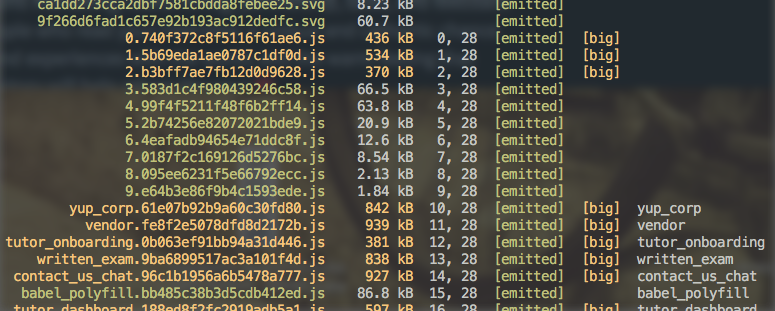<tweet gone missing>
Webpack 2.2 has reached release candidate 4, the last pre-release version. Time to update!
My motivation was "Ugh, I'm tired of these 3min+ local compile times. The amount of waiting is too damn high!" The new features are a nice bonus too.

After many days of fiddling, my Webpack is ready. Production compiles take 219 seconds instead of 226, and local dev compilation takes 152 seconds instead of 151. It’s not that worth it, but incremental compiles with Webpack in watch mode feel smooth as silk.
I love the new feature that highlights big files and tells you initial load sizes for different apps. I’ve been using it to eyeball different options, and I'm sure it has bigger use cases, too. Fine-tuning code splitting perhaps?


Then again, rc4 just disabled these features by default "because they're annoying". I liked it.
Webpack recommends keeping files under 250kB, which sounds like a lot, but it looks damn small compared to my code. Did you know 196kB of source ES6 compiles into about 920kB of browser-ready JavaScript? With minification, tree shaking, and dead code elimination! Without that, it's 2.3 megs. ?
The day when we ship raw ES6 code can't come soon enough.
BTW: Tree shaking removes unused dependencies (like when you import a whole library but just use a function or two), and dead code elimination removes code that's unreachable, like functions you never call.
So is upgrading to Webpack 2 even worth it?
Totally. Once they and the ecosystem resolve some issues, tree shaking will ride eternal, shiny and chrome.
Here are some gotchas I discovered while upgrading.
It's not quiiiiite ready yet (dependency hellish)
You can use Webpack 2 in production. I'm about to start.
@TheLarkInn in the midst of upgrading our prod app to Webpack2.
— Swizec Teller (@Swizec) January 11, 2017
Prob going live within the week.
Although now that they’ve promised to release the final version in < 10 days, I might wait. Or gently delay the code review and QA process until their release. We'll see :)
But here's one thing that's really awkward right now.
When you upgrade to Webpack 2.2.rc.x, you fall into a small dependency hell with extract-text-webpack-plugin. The released version depends on Webpack 2.1, which is silly. If you're going bleeding edge, you might as well go all the way, ya know?
So here's what you have to do:
// packages.json
"dependencies": {
//...
"extract-text-webpack-plugin": "git://github.com/webpack/extract-text-webpack-plugin#cbd4690",
"webpack": "^2.2.0-rc.3"
I'd show you the npm install command, but I don't know how to point at specific commits. See that #cbd4690 hash? That's the exact commit that says Add webpack 2 RC compatibility.
This is fragile and a terrible idea. You will forget to update this dependency in the future, and it will continue to point at a random commit for the foreseeable future. Happens every time.
But the published version on npm doesn't work. ? I assume they'll fix it for final release.
Why extract-text-webpack-plugin? It makes stylesheet imports better, I'm told.
It moves every require("style.css") in entry chunks into a separate css output file. So your styles are no longer inlined into the javascript, but separate in a CSS bundle file (styles.css). If your total stylesheet volume is big, it will be faster because the stylesheet bundle is loaded in parallel to the javascript bundle.
See? Useful.
You also have to update babel-loader to at least 6.2.10. That's when they added support for Webpack 2 rc. Not too bad.
Funny config updates, but better docs
The new Webpack 2 docs are so much better. Check out this wonderful Migrating from v1 to v2 official guide. You basically have to do a find & replace, and you're done.
Just don't forget to take '' out of resolve.extensions. I don't remember why everyone needed that in the past, but I know that the new Webpack throws an error.
Error reports for bad configuration are also better now. That was fun to see. Loved it.
CSS/Less and PostCSS plugin
If you're not using Webpack to load CSS and compile Less or Sass, you should. It's made my life a lot easier. Especially the PostCSS plugin makes your CSS easier to write.
Going from Webpack v1 to Webpack v2 involved many changes in this config. We used to have this:
// webpack.config.js
loaders: [
// ...
{
test: /\.(less|css)$/,
loader: ExtractTextPlugin.extract("style/useable", "css?sourceMap!postcss-loader!less-loader?sourceMap=true"),
include: [
path.resolve(__dirname, "app/assets/stylesheets")
]
},
{
test: /\.css$/,
loader: ExtractTextPlugin.extract("style/useable", "css?sourceMap!postcss-loader?sourceMap=true")
},
// ...
],
postcss: function () {
return [
precss,
// UglifyJSPlugin mangles valid css during minfication. It is a known issue and this fix was obtained from: https://github.com/webpack/webpack/issues/666#issuecomment-184319770
postcssImport({ addDependencyTo: webpack }),
postcssURL(),
postcssNext({
browsers: ['last 2 versions', 'ie >= 9'],
compress: true
}),
cssnano({zindex: false})
// end UglifyJSPlugin fix
];
}
Which is probably too much config, but it worked. With Webpack v2 that's become more manageable and looks like this:
// webpack.config.js
module: {
rules: [
{
test: /\.(less|css)$/,
use: [
ExtractTextPlugin.extract({
fallbackLoader: "style/useable",
loader: "style-loader"
}),
{
loader: 'css-loader?sourceMap',
query: {
modules: true,
importLoaders: 2
}
},
'postcss-loader?sourceMap',
'less-loader?sourceMap'
]
},
]
},
So much less code ?
That's because a lot of it is now in a different file called postcss.config.js. That one is a copypaste of the detailed config for postcss itself:
const webpack = require("webpack");
module.exports = {
plugins: [
// UglifyJSPlugin mangles valid css during minfication. It is a known issue and this fix was obtained from: https://github.com/webpack/webpack/issues/666#issuecomment-184319770
require("postcss-import")({ addDependencyTo: webpack }),
require("postcss-url"),
require("postcss-cssnext")({
browsers: ["last 2 versions", "ie >= 9"],
compress: true,
}),
require("cssnano")({ zindex: false }),
// end UglifyJSPlugin fix
],
};
I don't know if the UglifyJS bug we're working around still exists, so I left the config as I found it. Just to be safe.
Looking at code blobs is hard, so here's what happened:
- Webpack 2 no longer allows plugin-specific config keys like
postcss. Everything must fit in therules.uselisting. - PostCSS now uses a separate config file called
postcss.config.js. This works out of the box. - I removed separate rules for compiled and uncompiled CSS.
- Everything goes in the
rules.usearray. - Use rules evaluate last to first.
- First, we use
less-loaderto compile Less to CSS. - Then, we use
postcss-loaderto do the PostCSS changes. - Then,
css-loaderenablesimport css from 'file.css'. - Finally,
ExtractTextPluginputs it in<style>.
All of this used to be encoded in the loader bang syntax before: css?sourceMap!postcss-loader!less-loader?sourceMap=true
Whomever came up with the use: [] syntax, you're the best. I love the new approach.
Tree shaking and optimization
Now for the reason we're all here: tree shaking.
Webpack 2 understands native ES6 imports and uses them as split points. That means it can organize your code into different chunks so you're only loading the JavaScript that you're using.
What it also means is that it understands when you're importing more than you need. Combined with the UglifyJsPlugin, it can eliminate that extra code.
I spent a lot of time looking for what exactly turns this feature on. Turns Out™, it's on by default. Just Works™.
Here's what you have to do:
- Tell Babel not to compile imports into CommonJS (require stuff)
- Enable UglifyJS
// webpack.config.js
rules: [
{
test: /\.js$/,
include: [path.resolve(__dirname, "app/assets/javascripts")],
exclude: [path.resolve(__dirname, "node_modules/")],
query: {
plugins: [
"transform-decorators-legacy",
"transform-runtime",
"transform-object-rest-spread",
"transform-react-constant-elements",
"transform-class-properties",
],
presets: [["es2015", { modules: false }], "latest", "react"],
},
loader: "babel-loader",
},
];
// ...
plugins: [
new webpack.optimize.UglifyJsPlugin({
compress: {
warnings: false,
screw_ie8: true,
conditionals: true,
unused: true,
comparisons: true,
sequences: true,
dead_code: true,
evaluate: true,
join_vars: true,
if_return: true,
},
output: {
comments: false,
},
}),
];
See that {modules: false} in the babel-loader config? That's new. You can specify options when defining Babel plugins and presets.
modules: false tells the es2015 preset to avoid compiling import statements into CommonJS. That lets Webpack do tree shaking on your code.
UglifyJsPlugin without extra config will do what we need, but I wanted to show you the options. It's unused and dead_code that enable tree shaking.
However, we have to wait for the ecosystem to catch up. Most libraries are distributed with ES6 modules compiled to ES5, so in a real world scenario, you only get about 4% improvement. ?
With Webpack 2 around the corner, this is sure to improve. Can't wait!
You should also split your code into Your Code and Everybody Else's code. Webpack docs have a great guide on Code Splitting for Libraries.
Happy hacking ?
Continue reading about Migrating to Webpack 2: some tips and gotchas
Semantically similar articles hand-picked by GPT-4
- Webpack lazy loading on Rails with CDN support
- A dirty Webpack trick that reduced our gzipped bundle size by 55KB
- How We Used Webpack to Reduce Our JS Footprint by 50
- Fun surprise: UglifyJS can't ES6
- Arcane JavaScript knowledge still useful
Learned something new?
Read more Software Engineering Lessons from Production
I write articles with real insight into the career and skills of a modern software engineer. "Raw and honest from the heart!" as one reader described them. Fueled by lessons learned over 20 years of building production code for side-projects, small businesses, and hyper growth startups. Both successful and not.
Subscribe below 👇
Software Engineering Lessons from Production
Join Swizec's Newsletter and get insightful emails 💌 on mindsets, tactics, and technical skills for your career. Real lessons from building production software. No bullshit.
"Man, love your simple writing! Yours is the only newsletter I open and only blog that I give a fuck to read & scroll till the end. And wow always take away lessons with me. Inspiring! And very relatable. 👌"
Have a burning question that you think I can answer? Hit me up on twitter and I'll do my best.
Who am I and who do I help? I'm Swizec Teller and I turn coders into engineers with "Raw and honest from the heart!" writing. No bullshit. Real insights into the career and skills of a modern software engineer.
Want to become a true senior engineer? Take ownership, have autonomy, and be a force multiplier on your team. The Senior Engineer Mindset ebook can help 👉 swizec.com/senior-mindset. These are the shifts in mindset that unlocked my career.
Curious about Serverless and the modern backend? Check out Serverless Handbook, for frontend engineers 👉 ServerlessHandbook.dev
Want to Stop copy pasting D3 examples and create data visualizations of your own? Learn how to build scalable dataviz React components your whole team can understand with React for Data Visualization
Want to get my best emails on JavaScript, React, Serverless, Fullstack Web, or Indie Hacking? Check out swizec.com/collections
Did someone amazing share this letter with you? Wonderful! You can sign up for my weekly letters for software engineers on their path to greatness, here: swizec.com/blog
Want to brush up on your modern JavaScript syntax? Check out my interactive cheatsheet: es6cheatsheet.com
By the way, just in case no one has told you it yet today: I love and appreciate you for who you are ❤️

